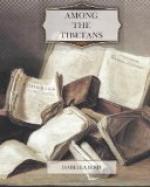We crossed the Toglang Pass, at a height of 18,150 feet, with less suffering from ladug than on either the Digar or Kharzong Passes. Indeed Gyalpo carried me over it stopping to take breath every few yards. It was then a long dreary march to the camping-ground of Tsala, where the Chang-pas spend the four summer months; the guides and baggage animals lost the way and did not appear until the next day, and in consequence the servants slept unsheltered in the snow. News travels as if by magic in desert places. Towards evening, while riding by a stream up a long and tedious valley, I saw a number of moving specks on the crest of a hill, and down came a surge of horsemen riding furiously. Just as they threatened to sweep Gyalpo away, they threw their horses on their haunches, in one moment were on the ground, which they touched with their foreheads, presented me with a plate of apricots, and the next vaulted into their saddles, and dashing up the valley were soon out of sight. In another half-hour there was a second wild rush of horsemen, the headman dismounted, threw himself on his face, kissed my hand, vaulted into the saddle, and then led a swirl of his tribesmen at a gallop in ever-narrowing circles round me till they subsided into the decorum of an escort. An elevated plateau with some vegetation on it, a row of forty tents, ‘black’ but not ‘comely,’ a bright rapid river, wild hills, long lines of white sheep converging towards the camp, yaks rampaging down the hillsides, men running to meet us, and women and children in the distance were singularly idealised in the golden glow of a cool, moist evening.
Two men took my bridle, and two more proceeded to put their hands on my stirrups; but Gyalpo kicked them to the right and left amidst shrieks of laughter, after which, with frantic gesticulations and yells of ‘Kabardar!’, I was led through the river in triumph and hauled off my horse. The tribesmen were much excited. Some dashed about, performing feats of horsemanship; others brought apricots and dough-balls made with apricot oil, or rushed to the tents, returning with rugs; some cleared the camping-ground of stones and raised a stone platform, and a flock of goats, exquisitely white from the daily swims across the river, were brought to be milked. Gradually and shrinkingly the women and children drew near; but Mr. -’s Bengali servant threatened them with a whip, when there was a general stampede, the women running like hares. I had trained my servants to treat the natives courteously, and addressed some rather strong language to the offender, and afterwards succeeded in enticing all the fugitives back by showing my sketches, which gave boundless pleasure and led to very numerous requests for portraits! The gopa, though he had the oblique Mongolian eyes, was a handsome young man, with a good nose and mouth. He was dressed like the others in a girdled chaga of coarse serge, but wore a red cap turned up over the ears with fine fur, a silver inkhorn, and a Yarkand knife in a chased silver sheath in his girdle, and canary-coloured leather shoes with turned-up points. The people prepared one of their own tents for me, and laying down a number of rugs of their own dyeing and weaving, assured me of an unbounded welcome as a friend of their ‘benefactor,’ Mr. Redslob, and then proposed that I should visit their tents accompanied by all the elders of the tribe.




